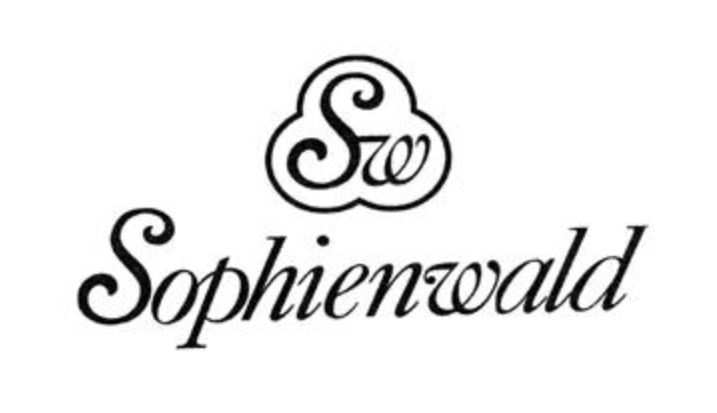The Austrian courts recently had the opportunity to provide some clarifications as to when a geographical indication, which is not protected as such under EU legislation, may be registered as a trademark, relying on the principles established more than 20 years ago in the “Chiemsee” preliminary rulings of the Court of Justice of the EU (CJEU, C-108/97 and C-109/97).

The Austrian figurative trademark reg. no. 285107 “Sophienwald” (depiction above) was registered in 2015 for goods in classes 14, 21 and 33, including raw or partially worked glass (except construction glass); drinking glasses, glassware, porcelain and earthenware in class 21. Of note, the area around the formerly Bohemian village of ‘Sophienwald’, which is today located in the Czech Republic (and named Nová Ves nad Lužnicí), is historically well known for the art of glass making, in particular in the 19th century. To advance the outcome, it is no longer registered as it has been cancelled as geographically descriptive.
A request for cancellation was brought on the basis of Art 33 Austrian Trademark Act, based on geographical descriptiveness*. The request was dismissed by the AT PTO, however, the cancellation applicant was successful at 2nd and 3rd instance. In its decision of 26.11.2019, case 4 Ob 152/19k, the Austrian Supreme Court (“OGH”) confirmed the 2nd instance decision of the Higher Regional Court Vienna (case 133 R 20/19t of 11.07.2019), cancelling the mark, with the following – summarized – reasoning:
- Firstly, the OGH recalled the criteria established by the CJEU in its Chiemsee preliminary ruling (joined cases C-108/97 and C-109/97). According to these criteria, geographical designations are excluded as trademarks if they designate places which the relevant public can associate with the category of goods in question now or in the future. It must be examined whether it can be reasonably expected that such a designation will be perceived by the public as designating the geographical origin of that category of goods. In particular, the extent to which the public is aware of the geographical name in question and the characteristics of the place and the group of goods are relevant to the assessment.
- According to these principles, a geographical name is not eligible for registration as a trademark if it is known to the relevant public and can be perceived as an indication of (geographical) origin because the relevant public establishes a link between the place or region and the designated product and reasonably believes that the product is closely connected with it, e.g. is an indication of the possible place of manufacture of the designated goods. Obsolete or historical names cannot be protected to the extent that the public still associates them with the relevant place. The same applies to foreign designations, both in the foreign language of the respective country of origin and in their German translation.
- On the other hand, if the geographical designation is perceived as (predominantly) fanciful, this may set off the geographical meaning. The name of a small and less known place, which has no historical, cultural, economic significance or due to its natural characteristics, and is therefore only familiar to a very small circle of well-informed persons, can be registered as a trademark (OGH 4 Ob45/04b – St. Zeno). In case of a specialised public, also a small portion of the relevant public can suffice to prevent registration.
- Considering the historical link of the term “Sophienwald” to the art of glass making, the OGH found it obvious that at least specialist glass dealers in Austria would perceive it as a reference to that region as a (historical) production site or source of raw materials. Both courts consider the trademark owner’s internet presence, where it had explicitly referred to the glass makers’ tradition of Sophienwald, as confirming this view, in spite of its use of the “®” sign next to the term “Sophienwald”. Moreover, the OGH found the Higher Regional Court’s findings that (i) the class 21 products, in particular drinking glasses, had a sufficient connection so as to be associated with this geographical location as well, and (ii) that the figurative elements did not alter the dominance of the element “Sophienwald” in the figurative mark, to be in line with established case law.
Let me briefly refer to a few previous decisions which, I believe are in line with the above mentioned principles:
- The city of “Bukhara” is one of the most important cities in Uzbekistan and a province capital, its name cannot be registered for raisins in class 29 (4 Ob 126/15f, OLG Wien 34 R 50/15w, Bukhara).
- The designation “Moosalm” (an existing location on a mountain) was largely unknown and therefore a fanciful designation of entertainment services in class 41 (OGH 4 Ob 8/95).
- On the other hand, the trademark “New Yorker” was denied trademark protection for clothing in class 25, as New York is so well known (OGH 4 Ob 59/95 – New Yorker).
Overall, the case law appears fairly comprehensible and consistent and should be borne in mind when seeking trademark protection of geographical names in Austria.
* The Austrian Trade Mark Protection Act (TMA), prohibits the registration of signs which consist exclusively of signs or indications which may serve, in trade, to designate (inter alia) the geographical origin of the goods or of rendering of the service (§ 4 (1) 4 TMA, in accordance with Art 4 (1) (c) of the Trademarks Directive – short “TMD”) (descriptive signs). Additionally, signs which are capable of deceiving the public as to the (inter alia) geographical origin of the goods or services, are excluded from registration (§ 4 (1) 8 TMA, Art 4 (1) (g) TMD). If registered in spite these obstacles, anyone may request the cancellation of such trademark under Section 33 TMA before the Austrian Patent Office (AT PTO).
_____________________________
To make sure you do not miss out on regular updates from the Kluwer Trademark Blog, please subscribe here.


